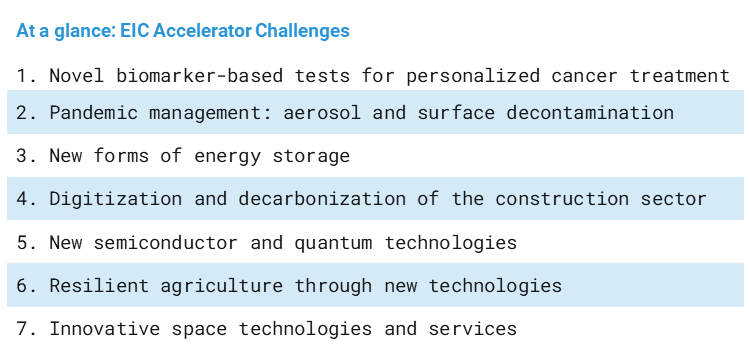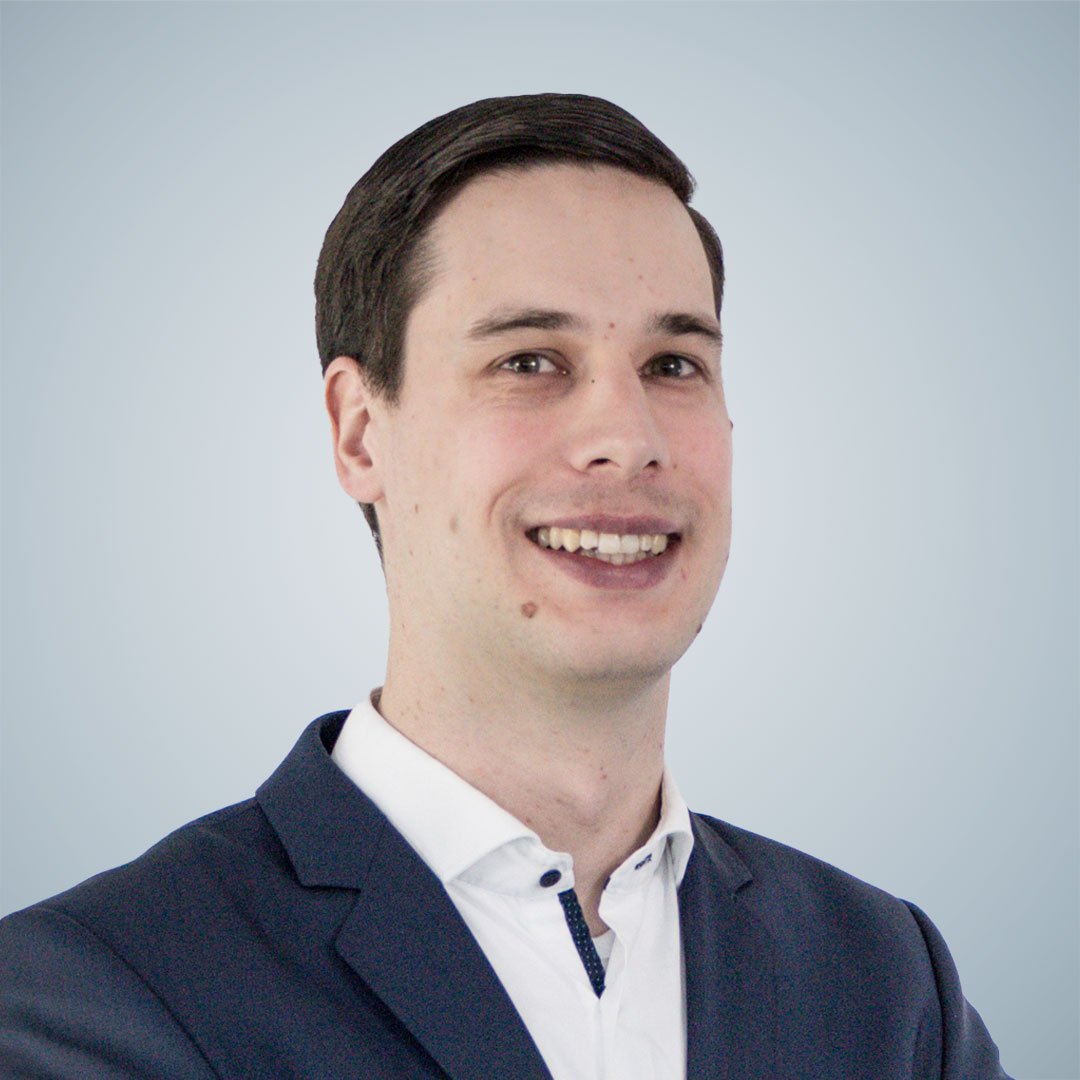- Mareike Deggelmann
- 26.01.26
- 3 min
- Funding advice, Agrifood, Bioeconomy
Your contact person
Stefan Durm
A total budget of €523.5 million is available for projects to be implemented under the EIC Accelerator Challenges. Topics of relevance to achieving the EU's objectives have been selected for the Accelerator Challenges. For 2023, the EU's focus is on REPowerEU, the reduction of dependence on fossil fuels from Russia, food safety, the further development of industrial technologies and the development of emergency measures in the health sector. By funding deep-tech innovations and identifying different novel approaches, the Accelerator Challenges aim to make progress in these difficult areas. Start-ups and SMEs participating in the Accelerator Challenges will benefit from funding of up to €2.5 million and equity of up to €15 million, so it's worth getting involved!

Clinical studies show that the current standard biomarker-based tests do not allow the treatment of cancer patients to be optimised. Predictive biomarkers are currently underutilised in clinical practice, although they are recommended for newly diagnosed cancer patients. Therefore, there is a great need for new and effective ways to predict, manage and monitor disease progression in patients with refractory cancers. The aim of the first EIC Accelerator Challenge is to improve the management of refractory cancers using new comprehensive predictive, prognostic, and diagnostic companion diagnostics in the context of precision oncology.
The EIC Accelerator Challenge is designed to support start-ups and SMEs with ground-breaking project proposals that target new forms of cancer treatment and that are working in the pre-clinical validation and/or phase I clinical trial stage. Novel companion diagnostics may be developed for more distributed, personalised treatment and prognosis of potential cancers, recurrence, reducing side effects or clinical monitoring of disease progression. The EU's long-term goal is to have a significant impact on the quality of life, life expectancy and survival of patients with refractory cancers.
For infectious diseases transmitted by aerosol suspensions of pathogens or by direct physical contact with colonised surfaces, social distancing is often the only effective measure. However, this can have a drastic impact on economic development. For example, air travel, sales activities, shared office work, etc. are not possible. In addition, the lack of social interaction is a major cause of depression and anxiety. As we have seen during recent pandemics, other mental illnesses are also fuelled by a lack of social interaction.
Technologies that enable social interaction are therefore needed for successful pandemic management. Initial successes have been achieved in the last three years with innovative barrier technologies for aerosol separation. Rapid pathogen detection has also become a reality, for example through PCR/LAMP or novel nanomaterials.
However, the technological potential to enable social interaction in the event of a pandemic is far from exhausted. By combining innovative air filtration systems, air purification devices, new pathogen detection methods, advanced face masks and surface disinfection, the aim is to strengthen EU industrial competitiveness in pandemic management technologies. Therefore, project proposals will be funded that address the development and commercialisation of technological solutions that enable social interaction in the context of pandemic events. To this end, the following solutions should be developed: Complete systems for high-efficiency indoor aerosol capture, novel face masks with intelligent filtering materials, and devices for rapid surface decontamination that go beyond the current state of the art. Overall, the portfolio of projects under the second challenge should contribute to significantly reducing or even avoiding social isolation in the event of a pandemic, as well as maintaining the economic situation and social dynamism within the EU.
Energy storage options play an important role in the EU's security of supply and flexibility. In addition, energy storage is essential for the integration of renewables, can support continuous energy supply and can be used to shift energy when additional energy is needed at short notice. This could also create new business models for energy services. The development of novel, cutting-edge technologies for the storage of electrical and thermal energy is therefore a high priority for the EU. The third EIC Accelerator Challenge will fund projects dealing with energy storage. The energy storage systems developed should be both cost-effective and highly efficient in terms of charging and discharging as well as durability.
With this Accelerator Challenge, the EU is aiming for market-ready, breakthrough technological developments that will advance independence from fossil fuels from Russia. Proposals may address the cost-effective and highly efficient storage of electrical or thermal energy. Proposals may also address the design of technological approaches to energy storage, e.g., chemical, electrical, electromechanical, mechanical, or thermal, at different scales, for different durations and for different applications. The development of technologies that operate without the use of critical raw materials and with low carbon emissions is also a focus of the third Accelerator Challenge. Overall, the project portfolio aims to create very novel, decarbonised, interconnected, sector-coupled and flexible energy systems that contribute significantly to Europe's energy independence.
The EU Commission has set itself a very ambitious target for reducing greenhouse gas emissions. Europe's CO2 emissions are to be reduced by 55% by 2023. This is another important milestone in the implementation of the European Green Deal, which aims to achieve a carbon-neutral European economy by 2050. However, the reality is different: the construction industry is responsible for around 12 percent of the EU's greenhouse gas emissions, so innovative solutions for this sector will be essential in the long term.
To fundamentally reduce greenhouse gas emissions from the construction sector and our built environment, a major transformation is needed in architecture, engineering, and construction. This requires the digitisation of the industry and the modernisation of value chains. Therefore, the overall objective of the fourth EIC Accelerator Challenge is to fund the development of digital products or digitally-enabled solutions for the construction industry to reduce CO2 emissions and achieve European climate neutrality. Funding will be provided to high-risk, breakthrough projects that propose solutions in the areas of computer-aided design, digital manufacturing, or alternative materials. Start-ups or even small and medium-sized enterprises will receive funding from the EIC Accelerator if they develop and scale up innovative products for the introduction of parametric, generative, and algorithmic processes, life cycle analysis or cutting-edge technologies for physical simulation or the creation of a digital twin.
With the fifth Challenge, the EU Commission is targeting start-ups and SMEs that want to develop new semiconductor and quantum technologies and bring them to market. The EU Commission is pursuing the strategic goal of becoming independent of non-European manufacturers, for example in China or the USA. The Challenge supports innovations in the field of components for processing quantum information and semiconductor chips.
The objective is to support breakthrough innovations with the potential to enable fault-tolerant quantum computing with improved performance, greatly simplified integration of quantum processing units with control electronics, and scalable control systems (e.g., scalable to tens of thousands of qubits for practical applications). In addition, the further development of quantum sensor components for practical applications, e.g., in ecotoxicology, pharmaceuticals or raw material detection, etc. will be supported. Innovations in quantum communication that can be applied in a real-world environment are also sought under this challenge. The EIC Challenge will also focus on disruptive semiconductor chips. Here, the design of innovative semiconductor components for analogue and digital integrated circuits and systems (including memory, logic, optical components, and sensors) will be funded. The scope also includes innovative design approaches aimed at combining different functions such as computing power, energy, memory, and sensors. It will also support the development of advanced chips to keep Europe at the forefront of the semiconductor industry for years to come.
Through the fifth EIC Challenge, start-ups are expected to bring their quantum technologies and approaches to the fabrication of innovative semiconductors to a higher level of maturity and closer to commercial application.
The European supply chain is considered fundamentally reliable for a variety of high quality and safe food products. However, this can be strongly influenced by external factors such as global warming, loss of biodiversity, pollution, or dependence on non-European suppliers, etc. Recent examples include the Corona pandemic and the war in Ukraine. In addition, agriculture and food production are complex and can be disrupted by even small negative impacts if they occur in rapid succession.
The sixth EIC Accelerator Challenge aims to support the development of technologies that enable sustainable agriculture and resilient food production. It seeks novel technological approaches and highly innovative equipment and materials (e.g., tillage, crop protection and harvesting machinery). The EIC will support breakthrough innovations that can bring radical change beyond the current state of the art, particularly in the areas of fertilisation, crop protection, irrigation, and soil management.
Start-ups and SMEs developing new processes, materials, equipment, and micro-organisms can also apply for funding from the EIC Accelerator. Overall, the funded projects aim to strengthen the resilience of Europe's food supply chain and increase agricultural productivity in the EU. They also aim to promote new environmentally sustainable technologies, restore European soil health, and improve ecosystem performance.
The seventh EIC Accelerator Challenge poses a special challenge. Here, the EU is addressing the space debris problem and defective satellites that lead to explosions in orbit due to fuel and battery residues on board. Most satellites cannot be maintained or repaired in space, posing a challenge to their owners and space agencies. For the EU space infrastructure, satellite maintenance and repair capabilities are of great importance to maintain its strategic autonomy over European space assets.
The Challenge will be used to support projects that help secure and protect Europe's space infrastructure. Funding will be provided for projects that enable the inspection of spacecraft in orbit and thus improve the resilience of satellites. Technologies for autonomous collision avoidance in space, e.g., by using AI, for localization of space debris or mobility in space are also funded. Further, the EIC is looking at ways to assemble and fabricate in orbit and to collect and recycle space debris. Likewise, projects that address space logistics, Earth observation, navigation, and satellite communications are eligible.
The EIC Accelerator Challenges are usually called three times a year. The application deadline is usually in spring, summer and fall. This year, you can still apply twice with an innovative deep-tech project. The application deadline is June 21, 2023, and October 4, 2023. If you have any questions about the EIC Accelerator Challenges, please do not hesitate to contact us.
| Summary The EIC Accelerator Challenges address seven topics, all of them current and future strategic challenges for the European economy and society. The topic-specific call in the EIC Accelerator is aimed at highly innovative start-ups and SMEs with high-risk project proposals. The EIC Accelerator supports projects with up to EUR 2.5 million with a funding rate of 70 percent and equity capital of up to EUR 15 million. |
||
Take off with the EIC Accelerator and prepare the EU for the challenges of the time, apply now! We will be happy to advise you and provide you with help and advice during the application process.
Take advantage of this unique opportunity and take your cutting-edge technology to the next level!
Author: Christina Tanosova

Your contact person
Stefan Durm
EurA AG
T- 079619256-0Max-Eyth-Straße 2
73479 Ellwangen
info@eura-ag.com